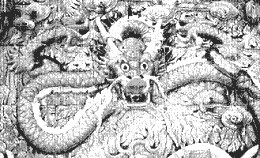Ancient China Simplified
by Edward Harper Parker

Chapter IV - The Southern Power
But the collapse of the imperial power in 771 B.C. led to restlessness in the south as well as in the north, north-western, and north-eastern regions: except for a few Chinese adventurers and colonists, these were exclusively inhabited by nomad Tartars, and perhaps some Tibetans, destitute of fixed residences, cities, and towns; ignorant of cultivation, agriculture, and letters; and roving about from pasture to pasture with their flocks and herds, finding excitement and diversion chiefly in periodical raids upon their more settled southern and western neighbours.
The only country south of the federated Chinese princes in Ho Nan province (as we now call it) was the “Jungle” or “Thicket,” a term which vaguely designated the lower waters of the Han River system, much as, with ourselves, the “Lowlands” or the “Netherlands” did, and still does, designate the outlying marches of the English and German communities. “Jungle” is still the elegant literary name for Hu Peh, just as Ts’in, Tsin, and Ts’i are for Shen Si, Shan Si, and Shan Tung. The King of the Jungle, like the Warden of the Western Marches, traced his descent far back to the same ancient monarchs whose blood ran also in the veins of the imperial house of Chou; and moreover this Jungle King’s ancestors had served the founders of the Chou dynasty in 1150 B.C., whilst they were still hesitating whether to accept the call to empire: hence in later times (530 B.C.) the King made it a grievance that his family had not received from the founder of the Chou dynasty presents symbolical of equality of birth, as had the Tsin and Lu (South Shan Tung) houses. If any tribes, south, south-east, or south-west of this vague Jungle, whose administrative centre at first lay within a hundred miles’ radius of the modern treaty-port of Ich’ang, were in any way known to Central China, or were affected by orthodox Chinese civilization, it was and must have been entirely through this kingdom of the Jungle, and in a second-hand or indirect way. The Jungle was as much a buffer to the south as Ts’in was to the north-west, Tsin to the north, and Ts’i to the north-east. The bulk of the population was in one sense non- Chinese; that is, it was probably a mixture of the many uncivilized mountain tribes (all speaking monosyllabic and tonic dialects like the Chinese) who still survive in every one of the provinces south of the Yang-tsz Kiang; but the ruling caste, whose administrative centre lay to the north of these tribes, though affected by the grossness of their barbarous surroundings, were manifestly more or less orthodox Chinese in origin and sympathy, and, even at this early period (771 B.C.), possessed a considerable culture, a knowledge of Chinese script, and a general capacity to live a settled economical existence. As far back as 880 B.C. the King of the Jungle is recorded to have governed or conciliated the populations between the Han and the Yang-tsz Rivers; but, though he arrogated to himself for a time the title of “Emperor” or “King” in his own dominions, he confessed himself to be a barbarian, and disclaimed any share in the honorific system of titles, living or posthumous, having vogue in China, reserving it for his successors to assert higher rights when they should feel strong enough. Like an eastern Charlemagne, he divided his empire between his three sons; and this empire, which gradually extended all along the Yang-tsz down to its mouths, may have included in one of its three subdivisions a part at least of the Annamese race, as will be suggested more in detail anon.
The first really historical king, who once more arrogated the supreme title in 704 B.C., took advantage of imperial weakness to extend his conquests not only to the south but to the north of the River Han, attacking petty Chinese principalities, and boldly claiming recognition by the Emperor of equality in title. “I am a barbarian,” said he, “and I will avail myself of the dissensions among the federal princes to inspect Chinese ways for myself.” The Emperor displayed some irritation at this claim of equal rank, but the King retorted by referring to the services rendered by his (the King’s) ancestor, some five hundred years earlier, to the Emperor’s ancestor, virtual founder of the Chou dynasty. In 689 B.C. the next king moved his capital from its old site above the Ich’ang gorges to the commanding central situation now known as King-thou Fu, just above the treaty-port of Sha-shi’: this place historically continues the use of the old word Jungle (King), and has been all through the present Manchu dynasty (1644-1908) the military residence of a Tartar-General with a Banner garrison; that is, a garrison of privileged Tartar soldiers living in cantonments, and exempt from the ordinary laws, or, at least, the application of them. It is only in 684 B.C. that the Jungle state is first honoured with mention in Confucius’ history: it was, indeed, impossible then to ignore its existence, because, for the first time in the annals of China, Chinese federal princes between the Han River and the westernmost head-waters of the Hwai River had been deliberately annexed by these Jungle “barbarians.” History for the next 450 years from this date consists mainly of the intricate narration how Ts’in, Tsin, Ts’i, and the Jungle struggled, first for hegemony, and finally for the possession of all China, The Jungle was now called Ts’u.
 Continue...
Continue...![[Buy at Amazon]](http://images.amazon.com/images/P/1594622604.01.MZZZZZZZ.jpg)